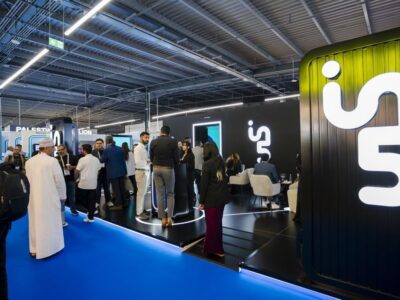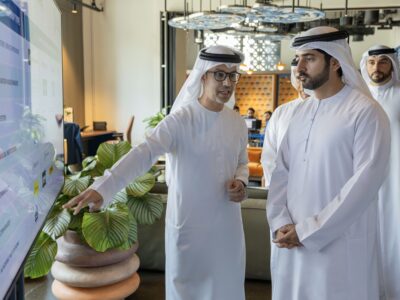Tarig El Sheikh couldn’t have timed it better.
When he came up with a new business idea in October 2014, Louis Lebbos and Muhammed Mekki, co-founders of the successful online fashion retailer Namshi, announced the soft launch of a new co-working space, the Google-partnered tech hub AstroLabs.
It’s no easy task to disrupt the HR and health insurance industry by developing affordable customised software programmes for all the HR needs of start-ups and SMEs.
However, El Sheikh knew that becoming the first start-up to enter the AstroLabs Accelerator Program in December 2014, regardless of the tech hub starting in a temporary space at the time, would help him in this endeavour.
As a serial entrepreneur already, he had an eye for recognising the right start-up environment. Putting aside a long list of tech start-ups he has been advising, the speed at which he has developed a few of his own seems like a personal race against time.
Istashir, a corporate finance and management consulting firm he set up in the UAE in 2011, was acquired two years and three months after the establishment.
Knot Standard, a Dubai-based e-commerce custom menswear company, developed a strong online presence and opened branch offices in NYC and Washington DC in just few years.
The growing number of employees inevitably accompanied this growth as well as the related admin work.
To free himself from the frustration of being burdened under the pile of HR paperwork, he set up Aythan, named after his son but later renamed to Beneple, a free online HR platform to help other fellow entrepreneurs manage payroll, compliance, benefits, and more.
“A big company can afford to pay an SAP or Oracle database tailored to what they do for $10 million and 20 percent maintenance fee y-o-y. It’s expensive. So what about 80 percent of 300,000 SMEs, just in the UAE alone? What are they using? Spreadsheets,” he explains.
Two other co-founders, Sajjad Kamal, a Dubai-based serial entrepreneur, and Bianca Wilton, who is well versed in all HR-related issues, joined him. The expectation was that they would have enough space for their growing team once the tech hub moved into its permanent 6,500 sqft co-working space towards the end of 2015.
What El Sheikh couldn’t have known was that by the launch event of the hub’s new space at the end of October 2015 they would have already become AstroLabs’s first success story.
Eight months after the beta launch in January 2015, Beneple was acquired by a Dubai-based financial services group for an undisclosed amount.
“These guys [Louis Lebbos and Muhammed Mekki, co-founders of AstroLabs] really helped create a platform where you can reduce the [start up] cost dramatically and fail fast,” he says to explain what the MENA’s only Google-partnered tech hub offers to locally-based entrepreneurs.
“Especially with that first seed capital, wherever you get it from, you need to put it on the product and the customer and see if it’s worth it, so you can fail quickly and say: ‘I wasted $20,000, but I know it’s not worth my time’,” he adds.
“It [being part of AstroLabs] means you could do eight of those a year and one of them will stick.”
Not only did starting at the time when AstroLabs Dubai opened its doors for the first time allowed them to avoid high set-up fees, but in many ways being part of this community helped them ‘pivot around 50 times’ as he explains, achieve 50 percent user base growth month-on-month, and much more.
“We are just creating a platform to attract amazing entrepreneurs where they can actually help each other,” says Lebbos in an interview with StartUp a day after the launch of the hub’s new space.
“The idea is the higher the quality of entrepreneurs we have in the community, the higher the quality of the next applicants will be.”
Located in Cluster R of Jumeirah Lakes Towers, AstroLabs, powered by Google for Entrepreneurs (GFE), the search engine giant’s start-up outreach programme, is a one-stop-shop for all disruptive tech entrepreneurs looking to scale.
The new space features a Google mobile device lab, five meeting and video conferencing rooms, a training and events facility, and artisanal coffee boutique 59 Degrees.
The hub’s strategic partnership with the Dubai Multi Commodities Centre (DMCC) provides members fast-tracked and subsidised business licences, enabling founders to immediately establish local UAE residencies and company bank accounts.
In addition to AstroLabs Academy, a number of specialised training courses being held in six MENA countries, various other benefits and learning opportunities are offered to members by the hub’s partners.
An exclusive GFE Passport Program allows the hub’s members to access over twenty Google-partnered hubs from Seoul to San Francisco.
They can also collaborate with a wider network of GFE partners or take part in the tech giant’s special programmes – Silicon Valley Blackbox Connect, GFE’s Women’s Demo Day, and Google for Entrepreneurs Exchange.
In December, AstroLabs will host a Google for Entrepreneurs Exchange Programme and bring twelve top travel start-ups from around the world to Dubai.
Recognising the hub’s impact on the regional start-up ecosystem, another partner TechWadi, a US-based non-government organisation, timed its first TechWadi Road Show with the official launch of AstroLabs.
TechWadi, also powered by GFE, seeks to unlock MENA’s potential by connecting local start-ups with Silicon Valley professionals and resources.
The ten-day roadshow kicked off in in Amman, Jordan, in mid-October and ended with a two-day educational workshop at the hub’s new premises in Dubai.
In between Jordan and the UAE, TechWadi mentors also advised start-up founders in Cairo and Beirut.
Speaking to StartUp at the workshop held at AstroLabs, Christina Ashtary, San Francisco-based TechWadi’s programme manager, said: “A lot of the Arab Americans in Silicon Valley, [who are] established entrepreneurs, investors, technology professionals, have been very shocked to see how booming the ecosystem has been.”
AstroLabs alone currently hosts 42 start-ups across 15 industries, with the founders hailing from 27 countries. One quarter of its members are women.
Mekki says: “We have put an investor hat on and selected them for their high potential in terms of the business idea itself, the early track record of execution from the team, and the attitude of the actual founders – their bringing not only seriousness to the table, but a collaborative attitude as well, which is exactly what we want to be able to build the community for everybody to flourish.
“You can’t buy community and it’s something that needs to be curated and formed very thoughtfully. That’s something we focus a lot on here and have been deliberate in bringing together some of the best start-ups from all over the world.
“That density of great entrepreneurs then pulls in like-minded people and that turns it into a machine that’s quite scalable and has a big impact overall.”
Scaling is what the Beneple team is now focused on. As a service that is essential to people’s lives, they’ve been vacuuming up customers rapidly, with 50,000 people already using the platform.
“The big story is that we very quickly realised that the best way to monetise is through offering the benefits and giving away the platform for free,” El Sheikh explains. “That’s how we grew so quickly.
“So all these systems and platforms will always stay free at its core, and how we make money is from all the data and information and providers that support companies.
“Another way we make our money is through capitalising on our broker’s licence. Because we have employee-level information, we can offer, not a must, as a broker to try and get the employers the best health insurance out there.
“And, obviously, the Dubai Health Authority (DHA) enacted a couple of laws that basically say that by next year everybody has to be covered by health insurance.”
Dubai Health Insurance Law No. 11 of 2013, which came into effect on 1 January 2014, requires from all employers in Dubai to put in place compliant health insurance cover for their employees. Large companies of more than 1,000 employees had to comply by 31 October 2014 while SMEs of less than 100 employees were given 30 June 2016 as the compliance deadline.
“So there’s like a macro picture push towards that. It makes sense because two million people are about to become insured. Good timing,” El-Sheikh adds.
With 15-strong team they plan to hit the 100,000 users mark by the end of the year. For that, they’ll soon need to expand outside the UAE. When talking about potential competitors, El Sheikh’s confidence is fact-based.
“Our product is extremely tailored to the region,” he says. “HR is not one of those things that you can set up in another country and off you go. Even within our expansion projects, which we’ll have to do soon, we’ll have to localise every time we do it, wherever we go.
“We can expand very quickly by adding modules to go into the GCC. Saudi Arabia is most probably a big market for us. But there are always subtle niches within each place that you have to relocalise again.
“So that’s a barrier to entry.”
While many larger enterprises still fail in stepping into the untapped benefits of collaborating with start-ups, their acquirer recognised their potential of disrupting the whole industry and, thus, made them their allies.
El Sheikh says: “We are very excited to have found a very small, select group that is really forward looking and embraces technology. The chemistry was right between the teams, and what started off initially as a partnership discussion, eventually moved on into an investment, and moved on into effectively a majority stake acquisition of the company.
“So we are now actually part of a consortium. We are a small start-up in a big monster and that’s why the name changed.”
However, El Sheikh explains that foresight is still lacking at the beginning of start-up funding curve in the region. With an initial investment of the three co-founders, the venture was soon supported by venture capital investors not from the region, but from South Africa and Germany.
“The risk appetite for people of that background earlier in the curve is just not here,” he says. “Over here, the venture capital landscape is incredibly new. It’s grown in the last five years but in terms of expertise and risk appetite there’s still a long way to go.
“And I don’t think that for the best valuation that this region is ready for that seed stage. They are great for Series A and above, they can write two, three or five million tickets once you have traction, but there’s definitely that gap at the beginning.”
Finding and retaining talented software engineers is another, often cited issue faced by start-up founders in the region. Talking about the major challenges experienced by local entrepreneurs in the four cities she visited, Ashtary says: “One thing we’ve been hearing, which is no surprise, is that [retaining] talent has been difficult and what came up at one of our panels is that companies are not paying their engineers enough.
“Engineers are gold, people pay them a lot and the point is to keep them in the companies. That’s something that has surfaced as being an issue with retaining talent.”
In the US, at the epicentre of the tech start-up boom, the number of conferred baccalaureate degrees in computer sciences conferred in the US increased by 24 percent from 2002 to 2012, but not enough to keep up with the demands of the on-going rapid tech boom. The scarcity of available talent has been driving the salary expectations up.
Ashtary explains that the region still needs to catch up with that trend. “Part of it is looking at business plans that are being put together and looking at how Silicon Valley companies work. Another issue is obviously funding,” she says. “So if companies can expand their business plans to include higher salaries for talent, they will be able to increase their talent and more likely to retain that talent.”
To help entrepreneurs navigate through all these obstacles, AstroLabs also has a pool of 30 mentors who commit at least two hours a month to their start-up community.
With their mentors coming from Dubizzle, Careem, 500 Startups, and similar, Lebbos explains that particular attention has been given to deciding who can come on board as an AstroLabs mentor.
“The founder’s time is the most valuable resource in a start-up. Period,” he says. “And when I’m asking them to spend their time with a mentor, I have to be quite sure that that mentor has high value. So this is basically why we are very conservative about that.
“Maybe having 100 mentors is something cool, but we don’t want to have 100 mentors.
“Curation is hard. You can invite mentors and they will say ‘yes’ although they are very busy. But curation also means saying ‘no’. We actually had a few people approach us. A lot of people think that being associated with the start-up, entrepreneurship ecosystem is something cool.
“We say ‘no’ quite often and it’s super awkward because we see these people at conferences, and similar.”
A lot of efforts towards one goal – making Dubai one of the world’s best start-up hubs. “This is what we are trying to achieve because we believe Dubai could beat on the global level,” Lebbos concludes.
“We are not aiming to show Dubai as a start-up hub for the region. Honestly, we’ve achieved that. But as being one of the global pools of technology start-ups.”








